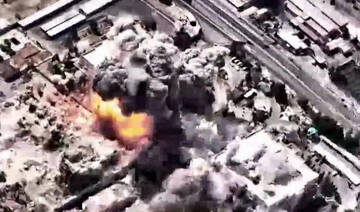BEIRUT: Starting Thursday morning, the Lebanese people will be put to the test again, as a new 11-day lockdown is imposed.
All projections predict a spike in the country’s coronavirus disease (COVID-19) cases in the upcoming days, while the hundreds of intensive care hospital beds dedicated to COVID-19 patients are full. Doctors have started to check on patients inside ambulances, and ask those who need oxygen to provide it at their own expense, and stay home.
According to the Lebanese Health Ministry’s statistics, there were 618 critical cases and 80,386 active cases as of Wednesday morning, while the number of daily cases recorded has not dropped below 4,300 for days. These infections came a week after social interactions during New Year celebrations.
A state of health emergency, a total lockdown and a curfew have been imposed in the country between Jan. 14-25, a period that can be extended, to face the most dangerous COVID-19 wave Lebanon has witnessed since recording its first case last February.
The Lebanese Armed Forces, along with the state’s security apparatus, will ensure the implementation of the curfew across Lebanon, noting that this is the first time the army has been asked to take part in the measures to limit the spread of the virus.
Under the state of emergency, “the security forces and judicial authorities have the right to strictly enforce the laws that punish the hospitals that refuse to treat urgent cases, including coronavirus cases, punish those who do not abide by the prevention measures, and issue tickets for those who violate these measures and contribute to the spread of the virus.”
The Supreme Defense Council has prohibited people from going onto the streets, with some exceptions for medical personnel, nursing staff, diplomats, travelers and the employees of a number of institutions that require minimum administration. However, food and grocery stores will only be operating through delivery service.
Lebanon’s land and sea borders will be closed from Thursday, while the country’s airport will be operating at its lowest operational capacity. Only transit passengers with tickets showing their crossing date will be allowed to cross into Lebanon through the land borders.
Minister of Health Hamad Hassan announced on Wednesday that he is now quarantined pending the necessary tests after three of his office staff tested positive for COVID-19, joining 18,715 others who have been forced to quarantine over the past 2 days.
This comes at a time when all eyes are on the government to the implement the measures after being criticized for a general state of confusion in previous weeks.
The country has also failed to form a government capable of leading the efforts to save Lebanon from its various crises beyond the coronavirus.
The Health Ministry’s statistics show that 45,445 positive COVID-19 cases were recorded in the first 12 days of January, while 53,559 cases were recorded during the whole month of December.
Firas Al-Abyad, director of the Hariri Governmental University Hospital, said that “a large number of people in Lebanon have caught the coronavirus. This requires … people to be admitted into hospitals, which are at their maximum capacity. What scares us is that we have reached the point that we did not want to reach.”
He expected that “the number of people in need (of) intensive care will double next week, which means that we are heading toward a major disaster.”
Dr. Abdul Rahman Al-Bizri, head of the Health Ministry’s Scientific Committee on Combatting the Coronavirus Pandemic, told Arab News: “I hope that the strict total lockdown will limit the spread of the virus. However, I am afraid of going back to how things were and completely opening up the country without any measures after the lockdown is over.”
Al-Bizri is the person charged with communicating with Pfizer, on behalf of the Health Ministry, to procure its coronavirus vaccine.
Lebanon begins 11 days of 24-hour curfews to stem COVID-19 surge
https://arab.news/mr6jv
Lebanon begins 11 days of 24-hour curfews to stem COVID-19 surge

- A state of health emergency, a total lockdown and a curfew have been imposed between Jan. 14-25
- Lebanon’s land and sea borders will be closed from Thursday, while the country’s airport will be operating at its lowest operational capacity
Israel says carrying out ‘large-scale strikes’ on Tehran

JERUSALEM: The Israeli military said it launched “large-scale strikes” on Tehran on Monday, two days since the start of a US-Israeli campaign against Iran.
“The Israeli Air Force... has begun an additional wave of strikes against the Iranian terror regime at the heart of Tehran,” the military said in a statement.
Israel announced the new “large-scale” strikes, while President Donald Trump vowed to avenge the deaths of US service members and said the war could last for weeks.
In other developments:
• The European Union has warned of the cost to the Middle East of a long war, and said it was reinforcing its naval mission in the Red Sea with additional vessels as Iran’s retaliation to US-Israeli strikes threatens maritime traffic, a European diplomat said.
Two new French ships will join the EU’s Aspides mission, bringing to five the number of warships taking part, the diplomat told AFP.
• Gulf states vowed to defend themselves against Iranian attacks, including by “responding to the aggression” if need be, after the Gulf Cooperation Council convened via video-link to formulate a unified response.
• Top US officials including Secretary of State Marco Rubio will make the case Tuesday to Congress for the attack on Iran. Rubio, Defense Secretary Pete Hegseth, CIA Director John Ratcliffe and military chief General Dan Caine “will brief the full membership of both chambers of Congress,” White House spokesman Dylan Johnson said.
• Container shipping company Maersk said it was halting passage through the Suez Canal and the Strait of Hormuz for “safety” reasons.
The Danish group was the latest of several shipping groups to make similar announcements after Iran’s Revolutionary Guards declared the strait closed on Saturday.
• Seven people were injured in the Jerusalem area following the latest salvo of missiles fired from Iran, Israeli firefighters said.
• British Prime Minister Keir Starmer said he had agreed to let the United States use UK bases to fire “defensive” strikes aimed at destroying Iranian missiles and their launchers. But in a video address posted to social media, he added: “We were not involved in the initial strikes on Iran and we will not join offensive action now.
• Iranian media reported that a police station in a city on the outskirts of Tehran had been hit, killing an unspecified number of people, with others reportedly trapped under debris. “According to initial reports, a number of citizens were martyred and some were trapped under the rubble,” the Tasnim news agency reported.
• Iranian news agency ISNA reported that Gandhi hospital in northern Tehran had been targeted by strikes. The Fars and Mizan agencies published a video, presented as being from inside the facility, showing debris on the floor among wheelchairs.
















